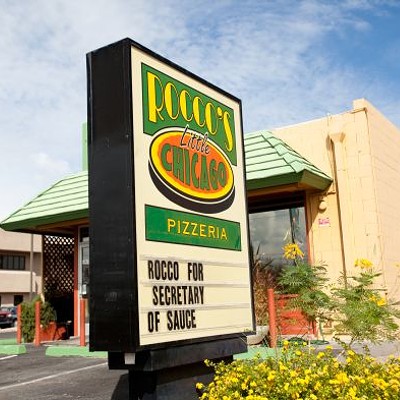Karyn Zoldan has a problem with that. It's been nearly a decade since she rescued Lilly. Today, the freelance Web designer and Tucson Weekly food writer still hates the notion of turning animals into racing machines, of caging them for 20 hours a day, feeding them raw scraps of low-quality meat and then tossing them aside when they fail to perform. That's why she started a Web site blog.
Not surprisingly, Tucson Greyhound Park has a problem with Karyn Zoldan--so much of a problem that they hired a big-shot local law firm to file a defamation lawsuit against her. On her attorney's advice, Zoldan declined to comment for this story. However, the lawsuit may draw more scrutiny of this rundown track than a legion of bloggers ever could.
On her Web site, Zoldan wrote that "tens of thousands of dogs have died at Tucson Greyhound Park during its 60-year tradition of racing."
That in particular tweaks track manager Tom Taylor. "She went beyond what she should have," he says. "And, sure, people have told us we'll just draw more attention with a lawsuit. But sometimes, you just have to say enough is enough."
The suit alleges that Tucson Greyhound Park's reputation has been unfairly injured by Zoldan's Web site. But her attorney, Chris Wencker, calls this a solid First Amendment case. Zoldan is "freely expressing her opinion regarding TGP," he says. "She's entitled to do so. Just because they don't like it doesn't mean that she can't say something."
Wencker says that if postings on Zoldan's site "are not absolutely true, they are at least substantially true. But TGP's position is that they are not only false, but demonstrably false. And that's something you cannot have both ways. Either something is true, or it's false." Besides, he says, "TGP is a public entity, and they've admitted as much. They're highly regulated by the government, so they have to expect that, as a cost of doing business, people are going to look at what they do and not like it. And people are going to say something about it." Still, that may be the least of worries at this southside track, where annual attendance has slipped by more than 10,000 in recent years, and cash bets have fallen by millions. "But my feeling is that the owners of the track are doing better than the track itself," says Wencker. "They were able to hire Munger Chadwick (P.L.C.), one of the marquee law firms in the city. And they have no less than five attorneys from that firm on this."
The track is owned by Florida businessmen Joseph Zappala and Robert Consolo Jr. Neither man returned phone calls from the Tucson Weekly seeking comment.
But attorney John Munger says Zoldan most egregiously crossed the line by suggesting that TGP is responsible for the deaths of so many dogs. "There is no evidence that tens of thousands of dogs died at the track," he says. "From time to time, we get retired dogs and farm them out for adoption. We only have them long enough to get adopted. From my understanding, it's only a couple of dozen dogs at any given time. It certainly wasn't tens of thousands of dogs.
"The inference is that these dogs have been mistreated," Munger says, "and that's what defamation is about."
But critics argue that over a 64-year lifespan, it's not hard to imagine that TGP has been responsible for the deaths of thousands of dogs, and that the track is simply trying to bully Zoldan.
Among those critics is Susan Netboy, founder of the Greyhound Protection League, headquartered in Penn Valley, Calif. Netboy was originally included in the lawsuit with Zoldan, but was later dropped from it. Perhaps TGP had second thoughts about suing someone with Netboy's resources and high profile. But according to Munger, park officials simply realized that she had only limited involvement with Zoldan's Web site.
Either way, the suit "felt retaliatory," Netboy says. "In my desire to fulfill our mission statement--to protect greyhounds nationwide--I've attempted to hold Tucson Greyhound Park accountable for various things that have gone on there. And that probably made them uncomfortable."
Meanwhile, the park may have to spill a few more beans than anticipated in this court case. Already, track officials seem to be dragging their feet on discovery--the requirement to provide information requested by defense attorney Chris Wencker--that might prove Zoldan's statements correct.
An especially contentious bit of information regards a database created in conjunction with the Arizona Department of Racing, meant to monitor all dogs having contact with the track. Munger gives about three different explanations about that database and why it hasn't been turned over. Then he simply accuses the defense attorney of asking the wrong questions.
"Chris asks for a database that falls under a (state) policy, and there isn't one," Munger says. "The state only asked us to put the database together about a year ago. He's looking for a database to sustain the truth of his client's statements, and there isn't one. He's looking for a database to prove that tens of thousands of dogs died at the track, and it's just not true."
When making those allegations, Zoldan must have been thinking about that temporary closing of the park last year, after the Arizona Department of Racing spot-tested trainers for drugs, and five turned up positive.
Or maybe she was recalling the 140 dogs that disappeared the summer before, after the park hired a Colorado man to distribute them to adoption facilities. Or perhaps she was pondering the 76 dogs removed from kennels leased to the park in July 2005. According to animal control officers, the kenneled animals were missing patches of fur, infected with fleas and ticks, terribly underweight and had no water.
Yep, that Lilly is one lucky dog.












